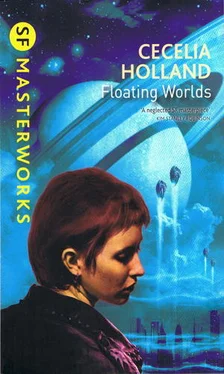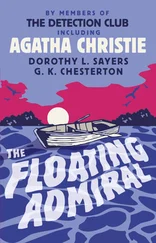They were walking toward the west wall of the dome. All the trees in the park had been cut down, and the ground was cluttered with stumps. It was like a wasteland. No birds sang and all the animals were gone. She sat on the edge of a gulley and slid down the bank. A cascade of dirt and stones followed her to its foot.
The Martians would probably find out almost immediately that they were gone. Sooner or later Cam’s police would catch them again. She thought of Jefferson, who had been caught, and drew her left hand out of her pocket. Opening her fingers, she looked down at the false eye.
“Here.” Bunker snatched it out of her hand. His arm cocked back and he flung the thing off into the dark, out of the gulley.
“What did you do that for?”
He went off at a fast walk along the floor of the gulley. An air car droned across the dome over her head. Red lights flashed in the sky. At the end of the gulley was a house built back into the hillside. A row of garbage bins flanked it. As soon as she and Bunker approached, a dog began to bark inside the house. The garbage bins were head-high. She climbed up onto the edge of the first one and dug out a moldering sack full of squeezed oranges and coffee grounds.
“Where did you get that key?” she asked Bunker.
He leaned over the edge of the bin and groped around in the heap of garbage. “I made it. They gave me a keyboard.”
She turned half an orange inside out, ate off the pulp, and threw the hull back into the bin. “To write letters? Did you write their correspondence? You don’t know the language very well. What was this exchange about?”
“The Styths have two pilots Hanse thinks he needs. He offered them money but they aren’t having any.”
“Who mentioned me?” The dog was barking steadily in the house. She found a heel of soggy bread and bolted it down.
“Nobody in my hearing. The Styths said they wouldn’t take money but they might consider meat. Their term. And henceforth in this matter Hanse could communicate in the Common Speech. That was the last I heard.” He jumped down and went to the next bin. “Here. You can use this.” He dragged something large out of the bin: a heavy coat, missing one sleeve.
They ate until they were satisfied and went on. Without trees, the land looked strange, flat, naked, vulnerable. Bunker led her along at a fast walk. There was no wind and the air smelled dry, dusty, and bitter. They came to a building scooped hollow like a grave. The below-ground floors had been bombed out.
“Well,” Bunker said, “so much for that.” He sat down heavily on the ground.
Paula went to the edge of the pit. She guessed he had lived here. The destroyed building gaped below her. She sat down next to Bunker and put her arm awkwardly around his shoulders, and he raised his head.
“What are you doing?”
“Don’t you find it comforting?”
He snorted up a laugh. “Junior, comfort maketh the mind dull.”
Day was coming. The eastern wall of the dome shone with fresh light. Her arm hung around his neck. He resisted; he would not rest on her. She took her arm away and buried her hands in her lap.
They sheltered in the ruins, in a forest of melted plastic drippings. She woke with the sunlight shining in her face. Bunker lay beside her. He had her shirt open down the front; his hand cupped her breast. She put her arms out to him.
“That was nice,” he said, after. “I kept telling myself the first thing I’d do when I escaped was get laid.”
Paula picked black chunks of grit off her clothes and out of her hair. “Do you want to stay together?”
“I hadn’t thought about it. Do you?”
She sat up, spreading out the coat he had found in the bin. It was stained and torn, a long heavily lined man’s coat with a notched collar. “For a while, at least. Until we find out what’s going on here.”
He stood to pull on his pants. His body was thin and bony, his chest sprinkled with crisp hair, graying like the hair on his head. “All right,” he said. “Let’s go.”
By daylight the whole dome seemed changed. Nothing was left of the wood but the stumps of trees. She could see from the ridge near the old campus all the way across the lake to the yellow hills south of the water. Everything looked much smaller. Many of the buildings had been blown up and packs of dogs drifted around the middle and south of the dome. The only birds she saw were crows.
Tony Andrea’s building was still lived in. She left Bunker digging through a trash can at the edge of the meadow and went cautiously in the side door. There was a big poster on the wall at the foot of the stairs reading: WORK IS LIFE. The floor was dirty and black handprints marked the walls around the doorways. She knocked on Tony’s door.
“Who’s ’ere?” a woman called, behind it.
“I’m looking for Tony Andrea.”
“Who?”
Paula backed away, looking up and down the hall. At the far end she saw another poster: HELP THE STATE—COOPERATE! In red paint across it and part of the wall beside it was scrawled: STRIKE—STRIKE—STRIKE. The woman behind the door called, “Who’s ’ere?” Paula went away.
She remembered An Chu’s message and went down the dome to the Nikoles Building. It was underground; she was shy of going into a place with so few ways out. At last she went down into the guts of the building and found the corridor where An Chu had said she was living. She could not remember the number of the apartment. On the corner of the green corridor was a list of the tenants. She stood before it, reading through it, without finding An Chu’s name. While she was looking down the list for the third time, a woman’s voice said, “Can I help you?”
She wheeled around, her hair standing on end. It was a tall, black-haired woman, too dark to be a Martian. Paula swallowed. “I’m looking for An Chu.”
“Who?”
The closed space around her suddenly pressed tighter on her mind. She turned down the corridor. The woman cried, “Wait!” Paula broke into a run. She reached the stairs and went up into the open day.
Bunker was waiting for her on the surface and they went off along the edge of the drying lake. There seemed to be a boundary of a sort, at the head of the lake, cutting the dome in half. South of this border, no building stood intact. Here and there a tree still grew, its branches fuzzed with leaves just unfolding from buds. The lake shore was scummed with dead weed. She saw no animals until just before dark, when a brown dog began to trail them.
“Dick.”
“I see her,” he said. He gestured at her. “You go that way.”
They split up. The dog followed Paula. Patiently she led it along the shore, moving slowly, careful not to look at it too much. Bunker circled around behind it. Paula sat down on the mud beach. There was a thick yellow froth in the water at the edge of the lake, like soap. The lake smelled of rot. The dog slunk toward her, until about fifty yards from her it lay down on its belly, its ears flat to its head. Under its rough dun-colored hide its ribs looked round and sharp as wire hoops. When she moved, it leaped up, its tail curled between its legs. Its dugs hung down along its belly. Paula settled on her hams again. She was painfully hungry. The dog watched her from the weeds, its head on its paws.
Bunker crept up on it, but he made some sound, and the dog bolted away. The man retreated, and the dog paused, its ears pricked up. Paula swore.
“Come on,” Bunker said. “Let’s walk it down.”
Her legs were already sore. She got up and went after him. The sun was setting. They followed the dog into the darkness. It ran in short bursts ahead of them, galloping out of reach, turning to watch them, dashing away again when they got too close. About an hour after dark, they lost it in the gulleys south of the lake.
Читать дальше











